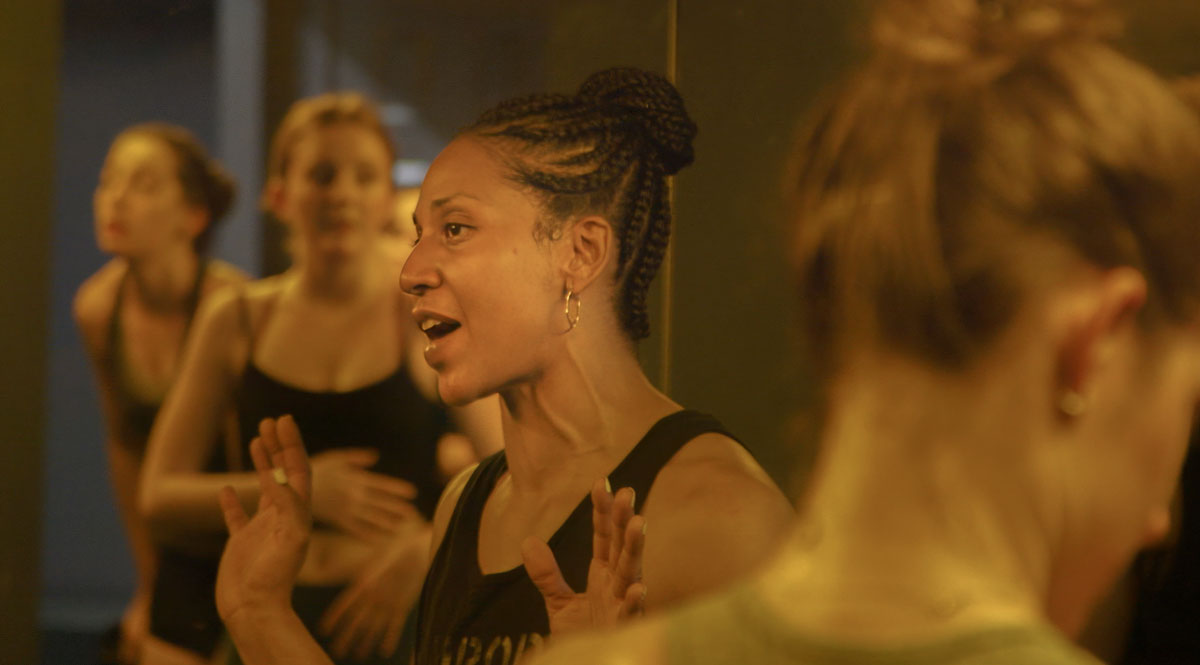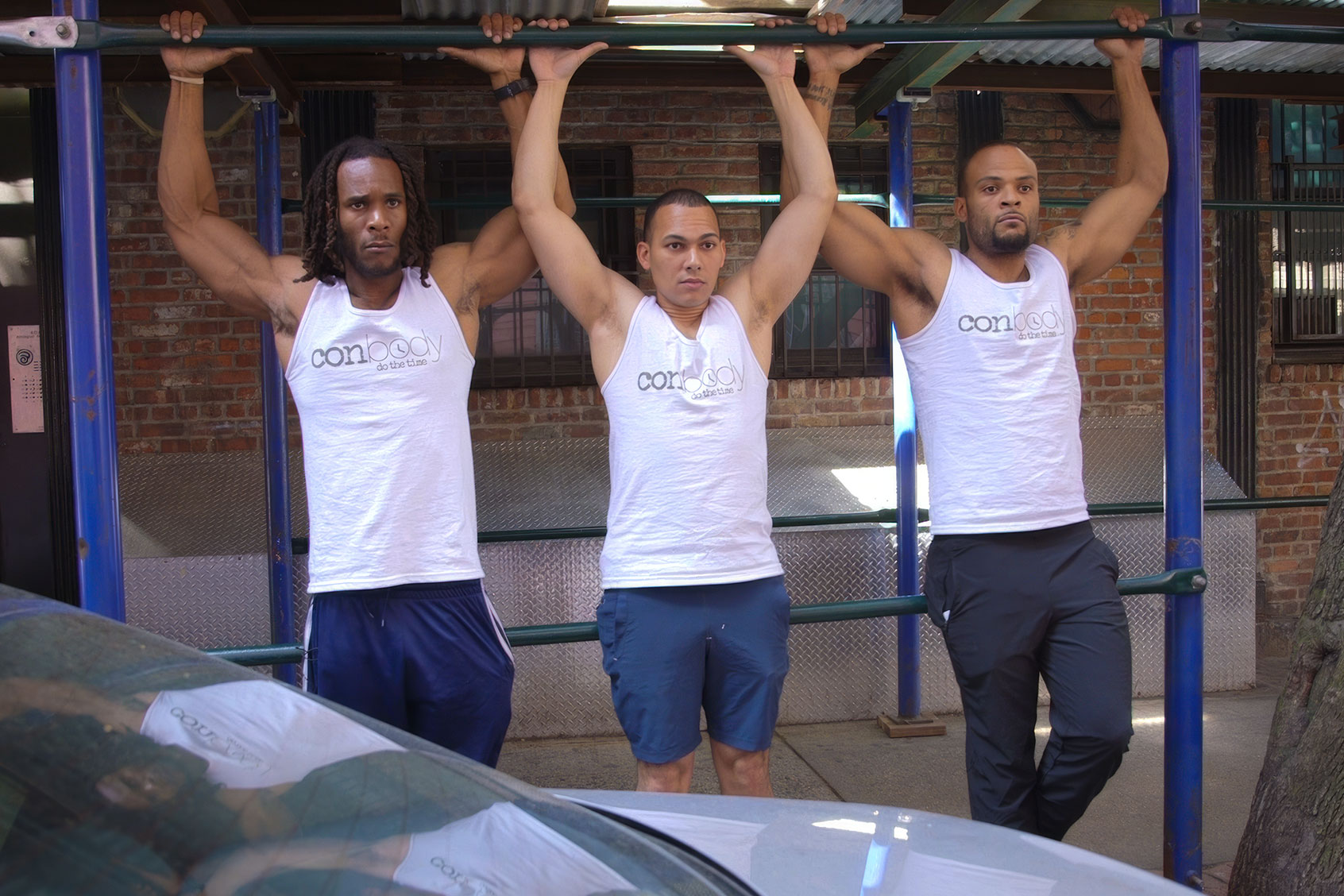Conbody, a prison-style bootcamp workout, was developed by Coss Marte while he was incarcerated. He lost 70 pounds in six months in his 9-by-6-foot solitary confinement cell doing body weight and cardio exercises. He also ran in the yard when possible. After being released in 2013, Marte started training people in the park the very next day. He opened his gym in the Lower East Side of New York City in January 2014 as a way of giving back to the community he was a part of when he sold drugs, which got him incarcerated. What is more, Marte hires formerly incarcerated folks first as interns, then, after certification, as trainers.
"Formerly incarcerated people have the same rates of unemployment as people did in the Great Depression."
“Conbody VS Everybody,” an engaging six-part documentary series, directed by Debra Granik (“Winter’s Bone”), chronicles Marte and several of his employees over an eight-year period. The series, which premiered at this year’s Sundance Film Festival, traces how Marte, as well as Syretta, Sultan, Shane and others, get a second chance but struggle with getting jobs and finding housing after getting out of prison. Significantly, working at Conbody has helped these formerly incarcerated folks maintain a 0% recidivism rate.
Marte spoke with Salon about his experiences and the inspiring “Conbody VS Everybody.”
What inspired you to create this prison-style bootcamp program and create an opportunity for others?
My inspiration — that’s a hard question. I try to keep progressing and keep moving forward. I try to do the right thing and live a righteous path. This is the way I was able to provide for myself and my family and help others gain employment and advocate for them.
You developed the “body builder burpee” which involves doing one jumping jack as well as a push-up. The exercises you developed are all body weight based. Can you describe the exercise regime?
We call it a prison-style bootcamp, because in prison we did workouts back-to-back, with a partner or without, and without stopping. At Conbody, we do 45 minutes of cardio and strength training exercises. We concentrate on a different part of the body every day of the week. We have “Better Booty” Wednesdays and “Hardcore Thursdays.”
You hire interns who need to get certified to coach. Can you talk about hiring and training your employees?
I have them go through the process of being a paid intern for two months to see if they are gearing up to get certified. If they get certified, they become a group fitness instructor. Then we hire you after that. Not everyone commits to two months. It’s not an easy internship, but it is an opportunity to get employment right away.
 Conbody vs Everybody (Participant)
Conbody vs Everybody (Participant)
The formerly incarcerated have difficulties with employment. You participated in programs and cleaned toilets for $8 an hour after getting out. What can you say about the difficulties of finding a job after being released?
For a person with my background and everything stacked against me, it was 20 times harder than for a normal person. Formerly incarcerated people have the same rates of unemployment as people did in the Great Depression. It’s a crazy system, and we are trapped in it. Once you are trapped in it, it is hard to get out. I was fortunate to get out because I did not stop working. I took every opportunity, whether it was cleaning people’s toilets or training in the park. I just kept moving and working. I didn’t raise funds. I bootstrapped and finally raised money during the middle of the pandemic. The whole Black Lives Matter movement — and more people wanting to invest and helping — was the first investment I basically got.
What observations do you have about the prison system and how you (and your colleagues) were treated after release, and dealing with parole?
Parole visits were one of the scariest things ever. You go on a parole visit, and one incident in that office can put you away for two years on a violation. I’ve seen that happen every time I’ve gone on a parole visit. Someone gets thrown on a wall or have really stupid arguments and people end up violating parole for two years. It’s scary. Your freedom can be taken right away in any instant.
There is discussion in the series about the difficulties of finding housing. Can you talk about that?
"We committed a mistake. We did our time. Why do we have to keep judging people?"
It’s hard for anyone. I was fortunate enough to have my brother. If you don’t have family, it is going to be hard to have success. If you come home to a halfway house and don’t have anyone to live with, what’s your next step? My brother helped me find an apartment under his name. It is frustrating. I feel blessed that I am in the position that I am in now.
Syretta, one of the subjects in the documentary, talks eloquently about how she is perceived as someone who was formerly incarcerated. What are the responses Conbody clients have to the staff? You are trying to destigmatize what a formerly incarcerated person looks like.
Syretta is a very special person. She did 22 years, and she is a very loving person — so happy, and welcoming, and reformed. Not everybody has that warm touch. We push to destigmatize because a lot of people see something in movies and all this bullsh*t and they perceive this is a bad person. We need to show people for who they are. They are human beings. We committed a mistake. We did our time. Why do we have to keep judging people for looks, or race or whatever? It doesn’t make any sense.
What can you say about fear and racism the formerly incarcerated face?
There is a lot of racism that still exists, and people judge a book by its cover. How do we stop that? That’s the difficult part. We need to communicate with each other. It is a generational thing that has been passed along for so many years, we need to continue spread the word and change [minds].
There is a scene of the staff having dental appointments in the Conbody lobby because they do not get to see dentists while incarcerated. Two guys discuss they still sleep on the edge of a bed because that is how they slept in prison. Can you talk about what folks have to deal with after they get out?
These are loaded questions! [Laughs] It’s a process. Coming out, you have to learn so many new things. It is very hard to cope with putting that all in one sentence. Everyone has their own hurdles. There are so many stories. I’m just one of them.
Can you describe something you had to deal with?
For me, technology was a shock. When I went in, everyone had flip phones, and coming out, everyone had touch screen phones. It was weird hoping on the D train, and everyone is staring at their phones, and no one is looking at anyone. Life was different before I went inside. I got dizzy when I went on the train!
Can you talk about being inside and being outside?
Dealing with prison — it is a whole different world inside. It’s a different law and order. It’s a different society and dealing with that is traumatic. Stepping into that world is different, so coming out to a different world is shocking. It is difficult to process and learn and adapt to right away. Trying to recap the last 10 years is wild. I’ve been home almost 11 years. It’s difficult to process and tell you about the whole journey in one interview.
How did you get your business going given the difficulties of being outside?
It was extremely difficult. A lot of times I wanted to give up and say f**k it. I felt I had no other choice but to keep moving forward. Running a business is a rollercoaster with up and downs. You just gotta keep running.
Want a daily wrap-up of all the news and commentary Salon has to offer? Subscribe to our morning newsletter, Crash Course.
You are not planning to go back to prison. Your program has 0% recidivism rate. What can you say about what you and your trainers face with that? You talked about the pressure of parole visits.
We have had trainers get re-arrested, but not convicted of any crime. The film shows that. People say recidivism rates are when you get arrested or convicted, but we never had anyone get convicted. We advocated for them to get out of the system, and we’ve won and had them released. It’s a wild journey.
How can folks support Conbody?
We have just one location now. We had more locations pre-pandemic. During the pandemic we kept the Lower East Side location open. We do virtual videos, and we do live video on demand. We are working on franchising now. We filed our franchise disclosure documents and ready to move forward. Are you going to come to my workout Monday at 8:00 a.m.? You can livestream it!
Read more
about this topic

